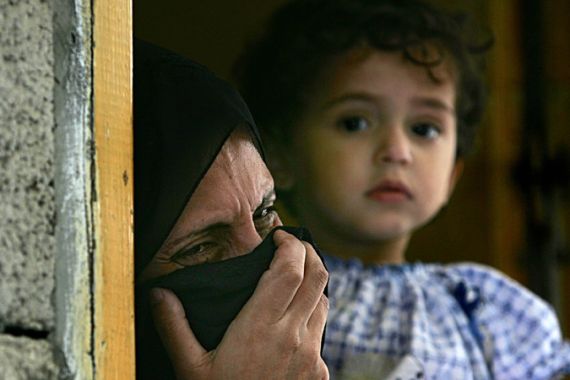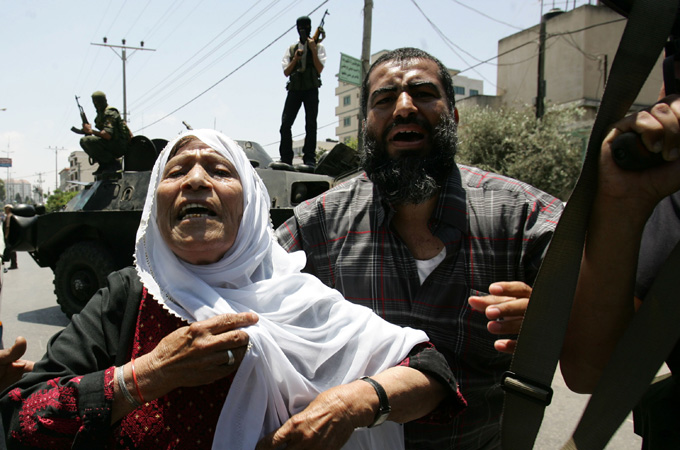Who will value Palestinian rights?
Fatah-Hamas reconciliation must begin with a vow to stop violating the human rights of those they compete to represent.

 |
| The Fatah-Hamas rift has polarised Palestinians [GALLO/GETTY] |
Hamas and Fatah have resumed reconciliation talks in a bid to heal the rift that has led to the Israeli occupied West Bank and Gaza Strip being governed by two separate bodies.
Previous meetings have failed to unite the two groups, whose differences have brought about the most serious schism in Palestinian history. There is nothing so far to indicate that this latest round of talks, taking place in the Syrian capital Damascus, will be any different.
But the suspension of talks between Israel and the Palestinian Authority (PA), as the latter continues to demand that Israel stop building illegal Jewish settlements, has provided an opportunity for the gap between Hamas and Fatah to be bridged.
The Hamas/Fatah split has served to polarise the Palestinian people, with no other force emerging either to unify the feuding parties or to replace them.
Both movements have historically achieved their claim to legitimacy through armed resistance to Israel. That legitimacy was reinforced through election processes in 1996 and again in 2006, when Hamas won the majority of seats in the legislative council, with Fatah, despite losing its leading status, showing that it remained an important player.
New elections must now be held to reflect the new power balance in the court of public opinion. But before elections can take place, unity must be achieved so that a situation which is conducive to a free and fair vote can prevail.
Holding a mirror
But even before the two groups reach an agreement on a political agenda, which is of utmost importance, they must make a serious commitment to respect the human rights of the Palestinian people. For while Israeli occupation represents the most flagrant violation of basic human rights, Hamas – through the deposed government in Gaza – and Fatah – through the PA – have also inflicted their share of abuses on Palestinians.
Hardly a month passes without Palestinian and international human rights organisations complaining of abuses being committed by one or both sides of the feud. Hamas can justifiably accuse the PA of suppressing its members in the West Bank to appease Israeli security demands, while Fatah can rightly accuse Hamas of repressing its members in Gaza. But neither security concerns, nor claims to represent the Palestinian resistance can justify human rights violations.
Hamas, just like the PA, has arrested people for engaging in resistance against Israel, although it argues that its case is different because it has no security agreements with Israel. But suppression is suppression regardless of who carries it out and it is clear that Hamas is trying to send a message to Israel that it, not Fatah, controls security.
All but a few Palestinian writers and bloggers have failed to hold both parties accountable for these abuses, focusing instead on exposing one while ignoring the other. But an activist or writer should be able to fully support Hamas or Fatah, depending on their own political standing, while remaining committed to human rights and holding a mirror to their own party.
Both parties are participating in a process of self-destruction as long as they continue to ignore the human rights of the people they are competing to represent.
Deep scars
Palestinian human rights organisations are now forced to keep a long record of complaints by Palestinians against Israel, Hamas in Gaza and the Fatah-dominated security forces in the West Bank.
Both have been guilty – to different extents on different occasions – of preventing or disrupting protest rallies or meetings, either concocting a justification or simply offering no reason at all.
Most worryingly, both have resorted to torture – leaving lasting scars on the bodies and the consciousness of the Palestinian people.
This ongoing power struggle – for this is largely what it is – over an authority that has no authority, has increased the violations, with each afraid of the challenge the other poses.
The sanest voices in all of this have been those of the Hamas and Fatah detainees in Israeli prisons who have been at the forefront of calls for unity and the formulation of unity platform proposals.
Palestinians have been urging the world to look into Israeli crimes and human rights abuses. They are victims of a colonial apartheid system, which is why participating in the abuse of their own people is not only unacceptable but a crime that must stop.
If the Hamas/Fatah talks are to have any real meaning they must begin with a vow to respect and cherish Palestinian human rights.
Lamis Andoni is an analyst and commentator on Middle Eastern and Palestinian affairs.
The views expressed in this article are the author’s own and do not necessarily reflect Al Jazeera’s editorial policy.